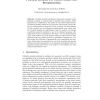Free Online Productivity Tools
i2Speak
i2Symbol
i2OCR
iTex2Img
iWeb2Print
iWeb2Shot
i2Type
iPdf2Split
iPdf2Merge
i2Bopomofo
i2Arabic
i2Style
i2Image
i2PDF
iLatex2Rtf
Sci2ools
135
click to vote
ECCV
2010
Springer
2010
Springer
Practical Methods For Convex Multi-View Reconstruction
Globally optimal formulations of geometric computer vision problems comprise an exciting topic in multiple view geometry. These approaches are unaffected by the quality of a provided initial solution, can directly identify outliers in the given data, and provide a better theoretical understanding of geometric vision problems. The disadvantage of these methods are the substantial computational costs, which limit the tractable problem size significantly, and the tendency of reducing a particular geometric problem to one of the standard programs wellunderstood in convex optimization. We select a view on these geometric vision tasks inspired by recent progress made on other low-level vision problems using very simple (and easy to parallelize) methods. Our view also enables the utilization of geometrically more meaningful cost functions, which cannot be represented by one of the standard optimization problems. We also demonstrate in the numerical experiments, that our proposed method scales...
Related Content
| Added | 08 Sep 2010 |
| Updated | 08 Sep 2010 |
| Type | Conference |
| Year | 2010 |
| Where | ECCV |
Comments (0)

